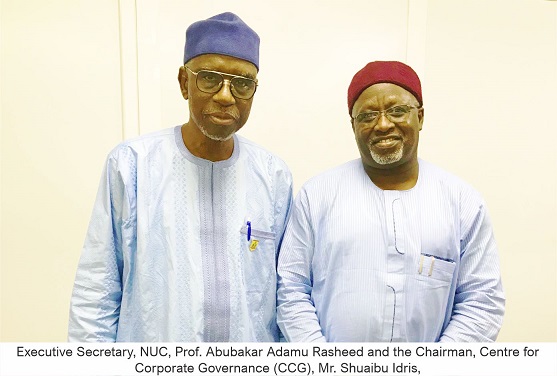
The Executive Secretary, National Universities Commission (NUC), Professor Abubakar Adamu Rasheed, mni, MFR, FNAL, last Thursday, received the Chairman, Centre for Corporate Governance (CCG), Mr. Shuaibu Idris, on a courtesy call to the Commission.
Briefing the Executive Secretary on his organisation’s mission, Mr. Idris said that he came to partner the NUC on the need to promote the ideals of corporate governance in the Governing Councils of Nigerian Universities.
The partnership, he stressed, would help to achieve sustainable university education that would work for all. He noted that the Institute of Directors (IoDs) Centre for Corporate Governance (CCG) was a registered non-profit organisation committed to improving and promoting good corporate governance principles in Nigeria through advocacy, research, high quality training and corporate Governance consulting.
The Chairman stressed that the organisation had been in existence for 15 years, adding that its establishment was necessitated by scandals revolving amongst leaders of organised private sector all over the world. He stressed that the organisation became effective in Nigeria through a collaborative project with the IoD, Securities and Exchange Commission (SEC) and the Corporate Affairs Commission (CAC). He added the organisation was also an affiliate member of the African Corporate Governance Network (ACGN) and had collaborated with the Centre for International Private Enterprise, (CIPE) Washington, USA on Anti-Corruption and Ethic compliance training and services.
Mr. Shuaibu said that in collaboration with the Financial Reporting Council (FRC), they had conducted corporate organisation audit and training in both Public and Private Sectors in Nigeria. The organisation, he said, however felt that the university system should not be left out, having noticed that, with the diversities in the establishment of Universities Governing Council, Lawyers, Accountants and Auditors needed to be appointed as members, so as to ensure accountability in the system.
He stressed that as far as University Education was concerned in Nigeria, NUC had continued to provide quality leadership by driving the system to greater heights, adding that it was based on this that the organisation wanted the NUC to be an institutional member of IoD for Corporate Governance. With this in mind, he advised that in partnership with NUC, they could do a number of courses or training for new members of Governing Council of Universities; carry out Governing Council Audit annually or bi-annually through top to bottom assessment. He also disclosed that the Organisation intend to publish its first ever IoD Compendium and called on the Commission to be part of the process.
Responding, the Executive Secretary stated that the NUC had no power to determine who was appointed to serve in the Governing Councils of Universities. According to him, there were established laws that define member’s appointment or how to select them to serve in the Councils.
He listed the composition of the Councils of Public Universities to include: Pro-Chancellor/ Chairman of the Council who is appointed by the President/ Visitor of the University; the Vice Chancellor and Deputy Vice Chancellors, Registrar, four members of the University Senate, two members of the Congregation, one member of the Convocation and four others.
Prof. Rasheed agreed that more needed to be done to ensure that members of Universities’ Governing Councils see themselves as key in instilling quality and stability in the university system. He acknowledged that this could only be achieved by promoting good corporate governance principles and archiving the goals of a productive university management system.
The NUC Scribe noted that on its part, the Commission had continued to set the pace in ensuring that quality was maintained in the delivery of university education in the country.
He outlined one of the measures to include the set up of a Strategic Advisory Committee NUC (STRADVCOM), with the aim of revitalising the system through curriculum review of all academic programmes in the Nigerian University System (NUS) which would soon be launched. He added that the Commission was in the process of digitising education to curb academic fraud as well as creating access to university education through the establishment of more universities in the country.
The Executive Secretary seized the opportunity to call for more private participation in university education in the country, highlighting that the system now had 99 privately owned universities out of the 203 available. He stressed that Nigeria with over 200 million people had only 2.16 million students currently enrolled. With these paltry numbers taking different courses at different levels in the universities. He said more needed to be done to ensure that youths yearning for university education were offered placements.
At the meeting was the NUC Deputy Executive Secretary, Mr. Chris J. Maiyaki. In the CCG delegation included the Registrar/ Chief Executive Director, Chartered Institute of Bankers of Nigeria (CIBN), Dr. Sheye Awojobi; Director Human Resource, Corporate Affairs Committee (CAC), Mrs Olayemi Oyeniyi; Ag/ODCCG. Mr. Narus Ekeze; Chairman IoD. Northern Zone, Mr. Joseph M. Tsunsar; Head, Chartered Institute of Bankers of Nigeria (CIBN) (Abuja) Annex, Mr. Jemilu Iliasu; and Head, Strategy Secretary, Dr. M. O Omamegbe.
